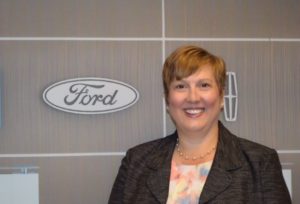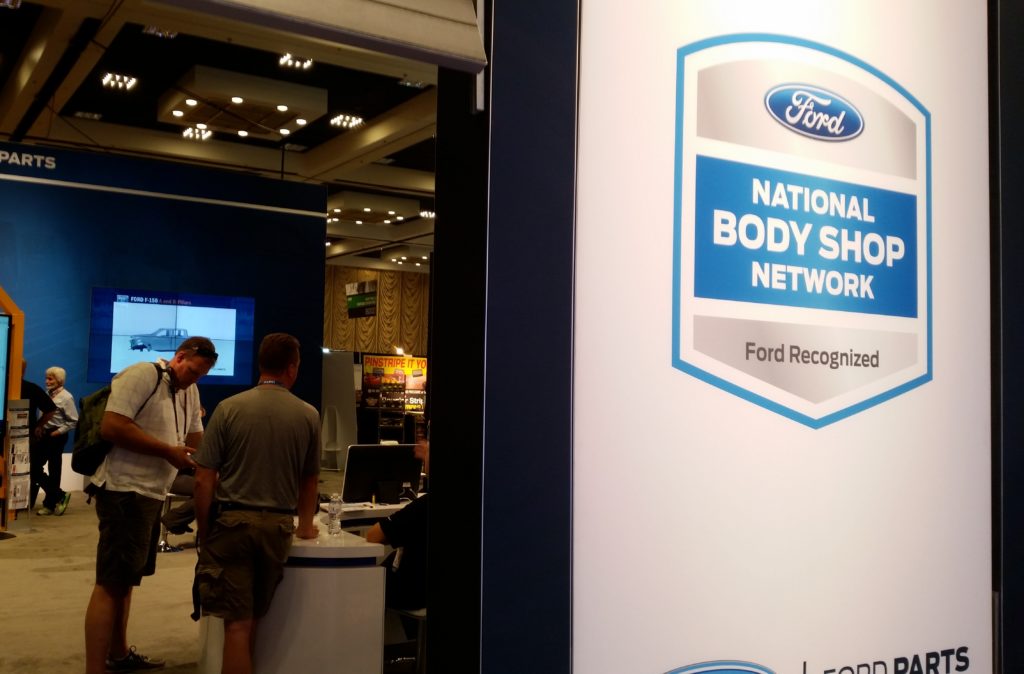
Ford still seeks certified auto body shops; OEM mulls greater scrutiny of shop work
By onBusiness Practices | Market Trends | Repair Operations | Technology
Correction: An earlier version of this article incorrectly described certification requirements for Ford dealership and independent body shops. Independent shops have since 2015 been required to meet both the general Assured Performance certification requirements as well as the Ford-specific aluminum checklist, Assured Performance CEO Scott Biggs said. Dealerships were allowed to be aluminum-capable but not meet the general requirements until this year, when Ford demanded they comply with the latter as well, according to Biggs. The story has since been corrected to reflect this.
Ford wants even more repairers to participate in its certified collision repair network, which could become more rigorous in the future.
Fellow Assured Performance OEM FCA said in 2016 that it checks up on scanning and repair procedure access, and Assured partner Nissan in April described plans to scrutinize shops with an eye to the “right repair.”
Ford global collision business and strategy manager Jennifer Boyer said that while Ford currently doesn’t audit individual repairs, the OEM is examining a variety of ways to check shop repair quality, though she couldn’t give specifics at this time.
“I think it is where we need to go,” she said.
She said Ford’s philosophy is quality repairs using OEM procedures and parts. “That drives all of the work that we’re doing,” she said.
Boyer said shops in any market are still welcome to pursue certification through the program administered by Assured Performance. Ford has never capped its network, and Boyer said it’s not taking that approach in individual markets.
“We have opportunity across the country,” she said.
While the program could demand more from shops in the future, the rewards could be great.
Boyer discussed research from two years ago that found 52 percent of respondents stating that OEM certification was most important to them when picking a body shop. IBIS reported that only 21 percent called a family or friend recommendation most important, 20 percent put an insurer recommendation No. 1, and 7 percent just wanted a convenient location.
Boyer said that as Ford considers its role in the industry and how best to serve customers, it was “really critical” to understand consumer needs and expectations and bring them to life in the marketplace.
In terms of letting customers know of certified shops’ existence, Boyer said her team has a marketing lead and an ad agency and performs a lot of work into consumer education.
“Our effort there is multifaceted,” she said. It involves promoting concepts like the collision repair network and a consumer’s right to new OEM parts, according to Boyer.
She said “we get a lot of traffic” on the certified shop locator on Ford.com,
“We’ll continue to work on that educational effort,” she said, calling it an important part of Ford’s strategy.
She said dealers also have access to a brochure about the network and OEM parts they can give out or put in the glove box at the time of sale.
General Motors has openly discussed having OnStar promote its upcoming collision repair network upon detecting a crash. Boyer said no similar effort, whether handled by a call center or by a digital referral, was in place at this time.
Asked if Ford was considering such a thing, Boyer cited Ford’s “smart vehicles for a smart world” philosophy.
“I think as you look at that specifically in the collision space, certainly, with the connected vehicle data, there is endless opportunities to support our customers in a time of a collision event,” she said.
Asked about dealership views on collision repair, Boyer cited two meetings with dealers in Chicago and Cleveland.
“The engagement is outstanding,” she said. “… It’s been remarkable.”
Both the dealers providing parts to the industry and those with on-site body shops seem to recognize the change in the industry and the opportunity before them.
She said those conversations were more around dealerships with existing body shops rather than dealers considering adding a new one.
Dealerships faced a steeper certification requirement starting this year, bringing them in line with what Ford and Assured Performance have required of independent shops for years.
Since 2015, independent collision repairers been required to meet both the general Assured Performance base certification requirements, a single checklist which qualifies a shop for multiple OEM networks, and the Ford-specific aluminum checklist, Assured Performance CEO Scott Biggs said.
Dealerships were allowed to be aluminum-capable but not meet the general requirements until this year, when Ford demanded they comply with the latter as well, according to Biggs.
Ford continues to engage with all stakeholders, viewing this as important, according to Boyer. She said that the company has conversations with insurers and discusses both direct repair programs and the Ford certified network, but she said she couldn’t offer anything definitive when asked if DRP networks were starting to show more overlap with the Ford network.
More information:
Ford OEM certification requirements
Ford list of aluminum collision equipment
Ford OEM repair procedures on OEM1Stop portal
Images:
Ford global collision business and strategy manager Jennifer Boyer is shown. (Provided by Ford)
The 2016 SEMA Ford booth promotes the OEM’s certification program. (John Huetter/Repairer Driven News)

